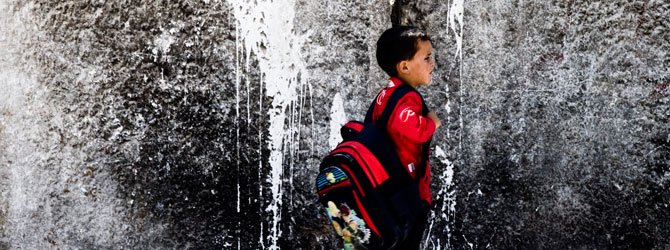-
Politics versus policy
Politics versus policy

In recent months, Israeli Defense Minister Moshe Ya’alon spoke of the need to redraw the Middle East, breaking up Western-created Arab states. His words reveal a trend in thinking on the West Asia-North Africa region; policy makers are trying to shrink their problems by shrinking nations and building walls. Abandoning efforts to wage peace, they have shifted to “managing conflict.” This trend is symptomatic of a greater thought epidemic: a focus on divisive politics rather than inclusive policy.
If West Asia-North Africa remains encumbered by politicking and unilateralism, solving the region’s problems by dividing nations only pits more bodies against one another. Instead, we need to transform the character of the system itself, its “architecture” so to speak.
Politicians cite the region’s recent history of conflict and violence like a eulogy for all hope. But I must instead remind you of our much longer history of interdependence. Bedouin laws of hospitality demand assistance to strangers, even enemies. These codes of honour and communalism dominated the regional order long before modern conflict. In today’s age of politicians prioritizing personal ambition over national well-being, this selflessness seems counterintuitive.
Far from it, our shared resource deficits demand a collective approach. The “others” so-defined by divisive politics seek the same water, security, and dignity that we do. And as long as this remain the case, this principle of interdependence remains relevant. Collective interests and common humanity are our best hope. Communal policy-making can not only maximise critical resources but quench West Asia-North Africa’s drought of civility.
Further international assistance in drawing lines on maps is not what West Asia-North Africa needs. Instead, we need an internal mindset shift towards mutually beneficial cooperative arrangements.
One way to begin this reorientation is through the establishment of the Middle East Treaty Organisation (METO), modeled after North Atlantic Treaty Organisation (NATO), which was proposed in 2001. Thirteen years later, supranational cooperation to foster economic growth and stability is needed more sorely than ever. Such a structure, perhaps rooted in the Arab league, could address regional threats like extremism and the propagation of weapons of mass destruction at the causal level. NATO’s success in Europe shows the potential for military and security cooperation to promote economic and political progress. Rather than stockpiling kindling for new wars, we must consider how wars end, plan for the aftermath of conflict, and draft a blueprint for a restructured region.
We must foster an environment of inclusion, civic engagement and human dignity within a forward-thinking and united coalition of Arab nations.
Corollary policy action can be taken in building resource-centered circles of cooperation to enable collaboration across borders on issues of resource sharing and conservation. More specifically, these organisations would support research and development on water conservation and climate change and implement policies stemming from this research. Treating shared resources as national goods can create a region-wide tragedy of the commons, in which countries competing to maximize internal consumption race towards a finish line of unmitigated resource exhaustion. Resource challenges, like the esoteric war on terrorism, are by nature transnational and addressing them must be a collective task.
A third step, and one particularly important for the empowerment of West Asia – North Africa’s people and fostering self-determination, is the development of a centralised, regional Zakat Fund. This fund, rooted in Islamic principles, could redistribute alms already required of the region’s Muslims to social development organisations. Transitioning private alms donations to a transparent and accountable organisation can disrupt poverty cycles and cycles of dependence, replacing them with cycles of collaboration. Fostering ground-up economic growth means governments can spend more wisely, limiting the need for low-return short-term spending and sparing time and energy for thoughtful policy creation. Reinvesting a portion of these alms in accordance with the Islamic tradition of Waqf would permit this fund to become a sustainable and long-term initiative.
Collectively, these steps can build resilience. The view of our region as endlessly divided and conflict-ridden has become a self-fulfilling prophecy. Yet leaders increasingly choose to view the future as one dominated by warfare. Just as war is nothing more than shirking the problems of peace, politics is nothing more than shirking the problems of governance. Peace is a conscious decision, as is policy-guided governance. We’ve let our region’s challenges dominate for far too long, now is the time to capitalise on our collective strengths.

